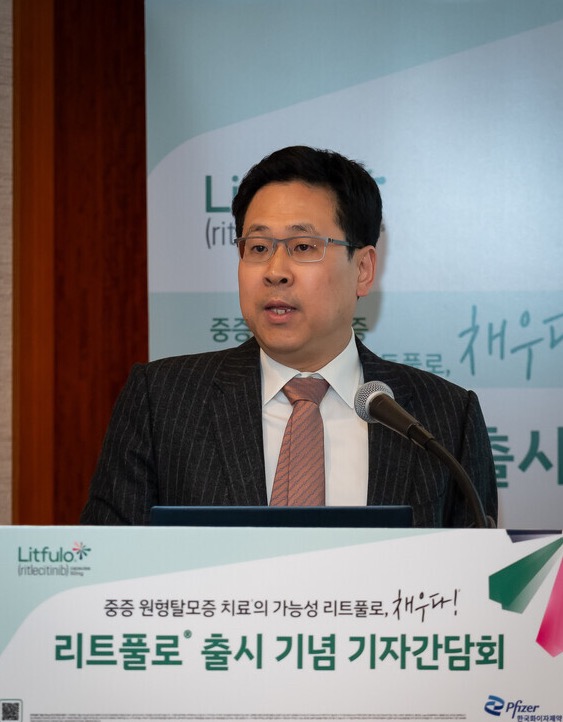Pfizer Korea has launched Litfulo (ritlecitinib tosylate), a new Janus kinase (JAK) inhibitor for treating severe alopecia areata in adolescents and adults, expanding treatment options for patients aged 12 and older in Korea.
The company hosted a press conference on Wednesday to highlight the clinical significance of Litfulo in managing the condition.

Alopecia areata is an autoimmune disorder that causes patchy or complete hair loss on the scalp, face, or body due to the immune system attacking hair follicles. While mild cases often resolve naturally or respond to treatment, the condition has a high recurrence rate, with 40-80 percent of patients experiencing relapse within a year. In severe cases, 100 percent of patients experience recurrence within 20 years, significantly impacting their quality of life and mental health.
In Korea, the number of alopecia areata patients has risen from 154,380 in 2013 to 178,009 in 2023, reflecting a growing demand for effective treatments.
"Alopecia areata not only leads to significant psychological distress but is also closely linked to mental health conditions such as depression, making it a crucial issue to address,” Professor Won Chong-hyun of the Department of Dermatology at Asan Medical Center said.
Won further explained that alopecia areata is not merely a cosmetic concern but a serious medical condition that disrupts daily life.
"Patients with severe alopecia often struggle with self-esteem issues, and the social stigma surrounding hair loss can exacerbate anxiety and depression,” he said. “Effective treatments like Litfulo can offer a new level of hope for those who have long suffered from this condition.”
He also pointed out that, despite the high recurrence rates, many patients had no effective treatment options until recently.
"Previously, we had to rely on steroids or immunosuppressants like cyclosporine, which came with significant side effects and inconsistent results,” he said. “With the introduction of JAK inhibitors, we now have targeted therapies that address the immune dysfunction driving the disease. This marks a transformative step in managing alopecia areata.”
Won highlighted the importance of early intervention, particularly in younger patients.
"While only about 10 percent of alopecia areata patients in Korea are adolescents, early-onset cases often require prolonged treatment and face a higher risk of recurrence,” he said. “Having an approved treatment for adolescents is a major step forward.”
Younger patients, when left untreated, are more likely to develop chronic, more severe forms of alopecia that are harder to manage later in life. Initiating treatment early can significantly alter their long-term prognosis, he added.
Litfulo was approved in Korea based on findings from the ALLEGRO 2b/3 global clinical trial, which assessed its efficacy in patients with at least 50 percent scalp hair loss (SALT score ≥ 50). The study, conducted across 18 countries at 118 institutions, involved 718 patients who were randomized into treatment and placebo groups.
At 24 weeks, 23 percent of patients receiving Litfulo (50mg once daily) achieved SALT ≤ 20, indicating significant scalp hair regrowth, compared to only 2 percent in the placebo group.
At 48 weeks, the percentage of patients achieving SALT ≤ 20 increased to 43 percent in the treatment group, compared to 10 percent in the placebo group, demonstrating continued improvement over time. In a long-term study, 45.1 percent of patients at 12 months and 60.8 percent at 24 months achieved substantial hair regrowth.
Pfizer Korea emphasized that 80 percent of Litfulo 50mg-treated patients showed significant scalp hair coverage at the 24-week mark.
Pfizer Korea aims to position Litfulo as a significant addition to the treatment landscape, addressing the unmet needs of both adult and adolescent patients.
"We are proud to introduce Litfulo as a new hope for patients suffering from severe alopecia areata,” Pfizer Korea Head of Specialty Care Business Unit Lee Ji-eun said. “We remain committed to improving treatment accessibility and enhancing patients’ quality of life."
Related articles
- Pfizer and Korea Vaccine Sales to co-promote Prevenar 20
- Pfizer Korea ends promotion of once-weekly growth hormone therapy Ngenla due to market uncertainty
- Pfizer wins Korea nod for pediatric arthritis use of oral JAK inhibitor Xeljanz
- [Interview] Ex-Samsung engineer couldn’t find a cure for his hair loss. So he built one with AI.
- Severe alopecia areata patient says what once felt hopeless now feels hopeful

